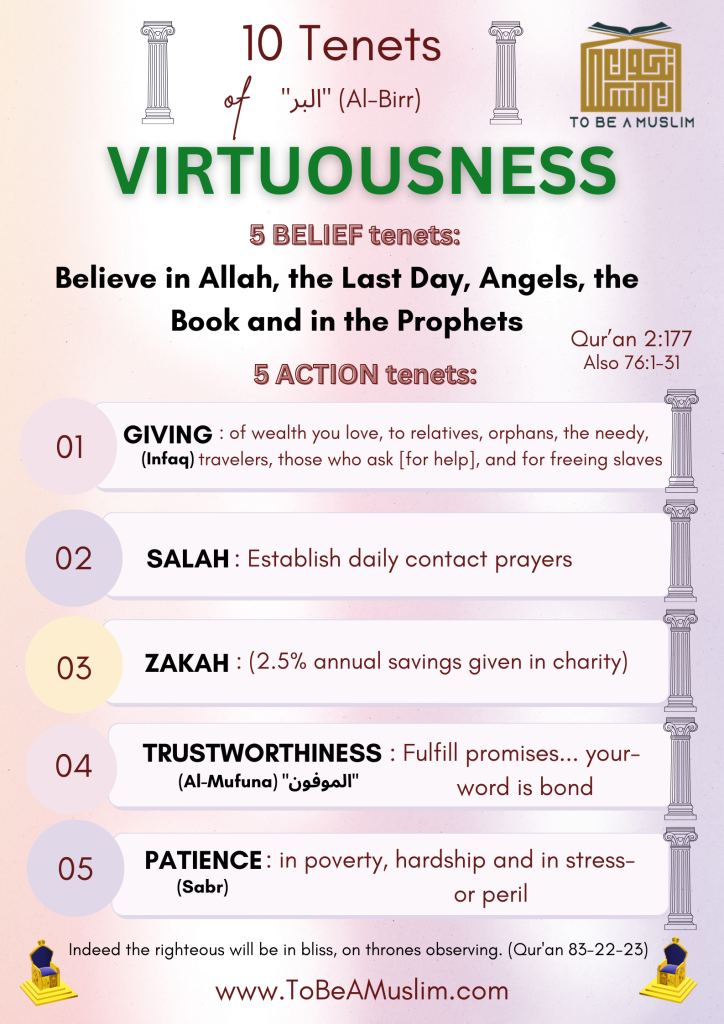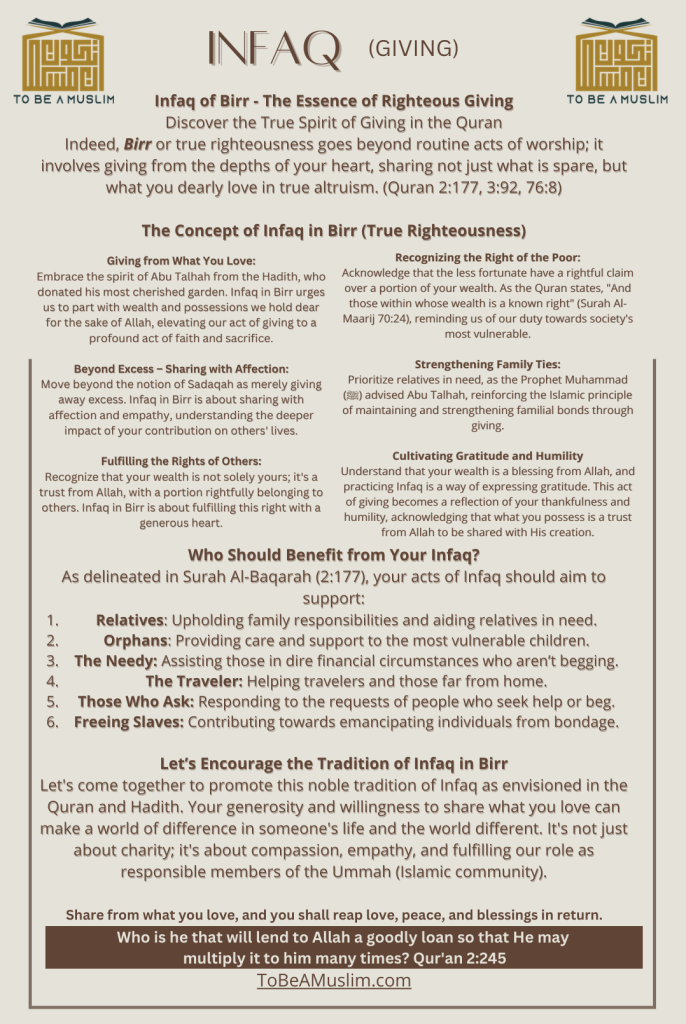
Infaq – Giving
Infaq, the Islamic practice of generosity and charitable giving, is a fundamental aspect of Muslim life and a key component of ‘Birr‘ or righteousness as outlined in the Quran. When combined with ‘Mufuna‘ – the commitment to keeping promises, the Muslim becomes a beacon and positive transformative force that radiates light across communities and societies.
Infaq of Birr – The Essence of Righteous Giving
Discover the True Spirit of Giving as Envisioned in the Quran
“Indeed, true righteousness goes beyond routine acts of worship; it involves giving from the depths of your heart, sharing not just what is spare, but what you dearly love.” (Based on Quran 2:177 and 3:92)
The Concept of Infaq in Birr (Righteousness)
- Giving from What You Love:
- Embrace the spirit of Abu Talhah from the Hadith, who donated his most cherished garden. Infaq in Birr urges us to part with possessions we hold dear for the sake of Allah, elevating our act of giving to a profound act of faith and sacrifice.
- Recognizing the Right of the Poor:
- Acknowledge that the less fortunate have a rightful claim over a portion of your wealth. As the Quran states, “And those within whose wealth is a known right” (Surah Al-Maarij 70:24), reminding us of our duty towards society’s most vulnerable.
- Beyond Excess – Sharing with Affection:
- Move beyond the notion of Sadaqah as merely giving away excess. Infaq in Birr is about sharing with affection and empathy, understanding the deeper impact of your contribution on others’ lives.
- Strengthening Family Ties:
- Prioritize relatives in need, as the Prophet Muhammad (ﷺ) advised Abu Talhah, reinforcing the Islamic principle of maintaining and strengthening familial bonds through giving.
- Fulfilling the Rights of Others:
- Recognize that your wealth is not solely yours; it’s a trust from Allah, with a portion rightfully belonging to others. Infaq in Birr is about fulfilling this right with a generous heart.
Who Should Benefit from Your Infaq?
As delineated in Surah Al-Baqarah (2:177), your acts of Infaq should aim to support:
- Relatives: Upholding family responsibilities and aiding relatives in need.
- Orphans: Providing care and support to the most vulnerable children.
- The Needy: Assisting those in dire financial circumstances.
- The Traveler: Helping travelers and those far from home.
- Those Who Ask: Responding to the requests of people who seek help.
- For Freeing Slaves: Contributing towards emancipating individuals from bondage.
Infaq in the Five Tenets of Ayatul Birr (2:177): The profound verse from Surah Al-Baqarah (2:177) beautifully defines the essence of Birr: “It is not righteousness that you turn your faces towards East or West; but it is righteousness – to believe in Allah and the Last Day, and the Angels, and the Book, and the Messengers; to spend of your substance, out of love for Him, for your kin, for orphans, for the needy, for the wayfarer, for those who ask, and for the ransom of slaves…” This verse places Infaq at the heart of righteousness, highlighting the importance of spending of what we love in the way of Allah as a manifestation of one’s faith and love for Him.
Quranic Emphasis on Infaq:
- Surah Al-Baqarah (2:261-262): “The example of those who spend their wealth in the way of Allah is like a seed [of grain] which grows seven spikes; in each spike is a hundred grains. And Allah multiplies [His reward] for whom He wills.”
- Surah Al-Imran (3:92): “You will not attain righteousness until you spend in the way of Allah from that which you love.”
- Surah Al-Hadid (57:18): “Indeed, the men who practice charity and the women who practice charity, and [they who] have loaned Allah a goodly loan – it will be multiplied for them, and they will have a noble reward.”
Allah (swt) promises multiple-fold reward for infaq. What more encouragement can be needed?
It is pleasing to note that Infaq is also clearly promoted as the first pillar of “pure religion” in the Bible:
Religion that God our Father accepts as pure and faultless is this: to look after orphans and widows in their distress and to keep oneself from being polluted by the world.
James 1:27
Blending Infaq with Mufuna: A Radiant Synergy
When Infaq (generosity) is practiced alongside Mufuna (keeping promises), it creates a potent blend of virtues that can significantly impact the believer and society. This synergy illuminates the path of righteousness and reflects the true spirit of Islam.
- Attracting to the Deen through Exemplary Conduct:
- The practice of Infaq, coupled with the integrity of Mufuna, serves as a powerful example of Islamic teachings in action. This combination of generosity and trustworthiness is compelling and attractive to both Muslims and non-Muslims, drawing them closer to the beauty and depth of the Islamic faith.
- Fostering Peace, Love, and Beauty in the World:
- These practices go beyond individual benefits; they contribute to building a more peaceful, loving, and beautiful world. Infaq addresses the needs of the less fortunate and fosters a spirit of communal support, while Mufun builds trust and reliability, essential for harmonious social interactions.
Infaq is not merely a charitable act; it is a transformative practice that, when united with Mufuna, can radiate light, attract souls to the deen, and foster an environment of peace, love, and beauty. This dual practice embodies the essence of what it means to live a life of Birr, making a profound impact on the world by exemplifying the true spirit of Islam.

Join Us in Reviving the Tradition of Infaq in Birr
Let’s come together to practice this noble tradition of Infaq as envisioned in the Quran and Hadith. Your generosity and willingness to share what you love can make a world of difference in someone’s life. It’s not just about charity; it’s about compassion, empathy, and fulfilling our role as responsible members of the Ummah (Islamic community).
“Share from what you love, and you shall reap love, peace, and blessings in return.”



